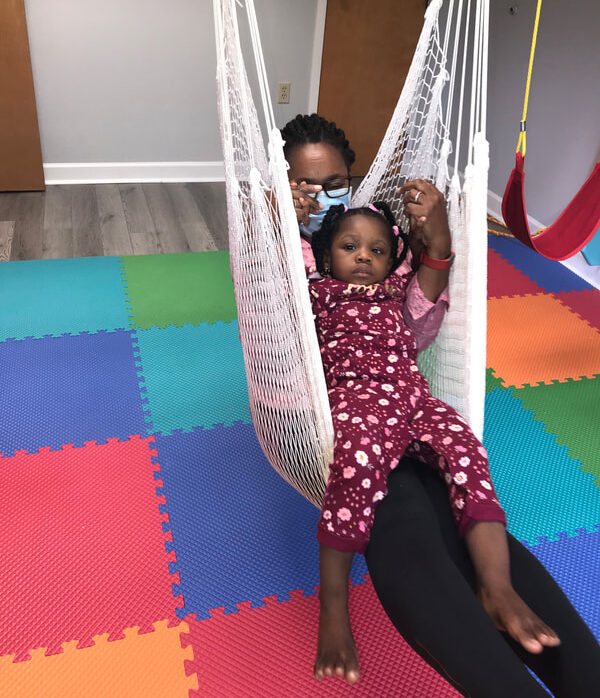Pediatric Occupational Therapy
Expert Occupational Therapy With A Combined 65.75 Years Of Experience for Children In Durham & Chapel Hill, NC
At Therapy Smarts, our occupational therapy team brings together an impressive 65.75 years of combined experience supporting children and families. That depth of knowledge means your child benefits from therapists who have seen it all — from early developmental delays to complex sensory, motor, and self-care challenges.
Pediatric occupational therapists work with children and adolescents to improve their functional abilities and participation in daily activities. Occupational therapists may work in various settings, including schools, hospitals, clinics, and home health agencies. They collaborate with parents, teachers, and other healthcare professionals to develop individualized treatment plans and provide support and guidance to families.
Occupational Therapy Services for Kids: Who can Benefit ?
Occupational therapy is here to help kids feel more confident and independent, no matter what challenges they’re facing. Whether your child struggles with daily routines, sensory issues, or has a specific diagnosis or delay, OT gives them the support they need to build important life skills. Our pediatric occupational therapists get to know each child and create a plan just for them, helping them grow, take part in everyday activities, and tackle new things with courage. With the right support, everyday hurdles can turn into big accomplishments.
Have Questions? We are Here to Help!
Does My Child Need Occupational Therapy?
Wondering if occupational therapy could help your child? Check out the difficulties below—if any of these sound familiar, an evaluation for treatment may be appropriate:.

- Easily Distracted
- Poor Attention Span
- Overly Sensitive to Touch, Movement, Sounds or Sights
- Difficulty Accepting Change
- Doesn’t Skip, Jump, or Hop on One Foot
- Activity Level Usually High or Low
- Poor eye hand coordination
- Difficulty dressing
- Low Muscle Tone
- Limited Play Skills
- Walks on Toes
- Walks into People or Objects Frequently
- Inability to “Unwind” or “Self-Regulate”
- Excessive Drooling
- Trouble using spoon or fork
- Doesn’t Chew Food Before Swallowing
- Attention Deficit Disorder
- Attention Deficit
- Hyperactivity Disorder
- Anxiety
- Autism Spectrum Disorder
- Brachial Plexus Disorder
- Cerebral Palsy
- Club Foot
- Developmental Delay
- Developmental
- Coordination Disorder
- Down Syndrome
- Dyslexia
- Edwards’ Syndrome
- Feeding Difficulties
- Fragile X Syndrome
- GERD/GER
- Lack of Coordination
- Mitochondrial Disease
- Doesn’t Feed Self
- Clumsy / Uncoordinated
- Constantly Touches People or Object
- Muscle Weakness (generalized)
- Poor Social Interaction
- Difficulty Holding a Pencil or Handwriting (3+)
- Oppositional Defiant Disorder
- Prader-Willi Syndrome
- Prematurity
- Seizure Disorder
- Sensory Integration Dysfunction
- Sickle Cell Disease
- Spina Bifida
- Spinal Cord Truma
- Stiffness of Joints
- Taylor Sachs Disease
- Torticollis
- Traumatic Brain Injury
- Turner’s Syndrome
- Williams Syndrome
No matter what your child is facing, getting early, personalized help can make a world of difference. Our occupational therapists take the time to get to know your child and create one-on-one support that really fits their needs. If you’ve noticed any of these signs, reaching out for an evaluation could be the first step toward helping your child feel more confident and succeed in everyday life.
Testimonials
Frequently Asked Occupational Therapy Questions
Occupational therapy (OT) helps children develop the skills they need for daily living, such as:
- Self-care (dressing, feeding, toileting)
- Sensory processing and emotional regulation
- Handwriting and fine motor skills
- Attention and executive functioning
- Play and social interaction
Signs include:
- Difficulty with self-help tasks
- Trouble holding a pencil, using scissors, or tying shoes
- Sensory sensitivities or avoidance (e.g., clothing textures, loud noises)
- Poor coordination or frequent falls
- Difficulty with transitions or changes in routine
We work with children from infancy through adolescence, supporting a wide range of developmental and sensory-motor needs.
Sessions typically last 45 to 60 minutes, and frequency depends on your child’s individual needs and goals.
Yes, occupational therapists are trained to address sensory processing challenges and help children regulate their responses to sensory input to improve comfort and focus.
Coverage varies by plan. We accept most major insurance providers and will help you understand your benefits during the intake process. Private pay options are also available.
Your involvement is essential! Therapists provide coaching and practical strategies to help you support your child’s growth between sessions.
Absolutely! Pediatric occupational therapists support potty training by helping children develop the motor skills, sensory awareness, and routines needed for success. They provide practical strategies to promote independence and address challenges that may affect the process.


